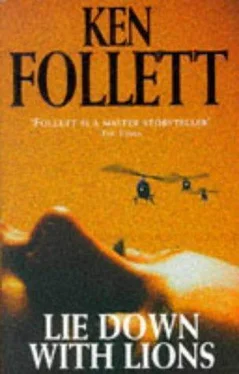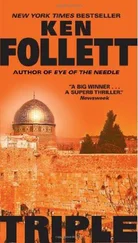Ken Follett - Lie down with lions
Здесь есть возможность читать онлайн «Ken Follett - Lie down with lions» весь текст электронной книги совершенно бесплатно (целиком полную версию без сокращений). В некоторых случаях можно слушать аудио, скачать через торрент в формате fb2 и присутствует краткое содержание. Жанр: Боевик, на английском языке. Описание произведения, (предисловие) а так же отзывы посетителей доступны на портале библиотеки ЛибКат.
- Название:Lie down with lions
- Автор:
- Жанр:
- Год:неизвестен
- ISBN:нет данных
- Рейтинг книги:4 / 5. Голосов: 1
-
Избранное:Добавить в избранное
- Отзывы:
-
Ваша оценка:
- 80
- 1
- 2
- 3
- 4
- 5
Lie down with lions: краткое содержание, описание и аннотация
Предлагаем к чтению аннотацию, описание, краткое содержание или предисловие (зависит от того, что написал сам автор книги «Lie down with lions»). Если вы не нашли необходимую информацию о книге — напишите в комментариях, мы постараемся отыскать её.
Lie down with lions — читать онлайн бесплатно полную книгу (весь текст) целиком
Ниже представлен текст книги, разбитый по страницам. Система сохранения места последней прочитанной страницы, позволяет с удобством читать онлайн бесплатно книгу «Lie down with lions», без необходимости каждый раз заново искать на чём Вы остановились. Поставьте закладку, и сможете в любой момент перейти на страницу, на которой закончили чтение.
Интервал:
Закладка:
A natural heart attack was unlikely, but by no means impossible, in a man of thirty-four years, especially one who had been exercising strenuously after a long period of relatively sedentary work. Anyway, there would be no inquest, no post mortem, and no suspicions: in the West they would not doubt that Ellis had been wounded in action and had died of his wounds. Here in the Valley, everyone would accept Jean-Pierre's diagnosis. He was trusted as much as any of Masud's closest lieutenants— quite naturally, for he had sacrificed as much as any of them for the cause, it must seem to them. No, the only doubter would be Jane. And what could she do?
He was not sure. Jane was a formidable opponent when she was backed up by Ellis; but Jane alone was not. Jean-Pierre might be able to persuade her to stay in the Valley for another year: he could promise not to betray the convoys, then find a way to reestablish contact with Anatoly and just wait for his chance to pinpoint Masud for the Russians.
He gave Chantal her bottle at two A.M., then went back to bed. He did not even try to sleep. He was too anxious, too excited and too frightened. As he lay there waiting for the sun to rise, he thought of all the things that could go wrong: Ellis might refuse treatment, he, Jean-Pierre, might get the dosage wrong, Ellis might have suffered a mere scratch and be walking around normally, Ellis and Masud might even have left Astana already.
Jane's sleep was troubled by dreams. She tossed and turned beside him, occasionally muttering incomprehensible syllables. Only Chantal slept well.
Just before dawn Jean-Pierre got up, lit the fire and went to the river to bathe. When he came back, the runner was in his courtyard, drinking tea made by Fara and eating yesterday's left-over bread. Jean-Pierre took some tea, but could not eat anything.
Jane was feeding Chantal on the roof. Jean-Pierre went up and kissed them both goodbye. Every time he touched Jane he remembered how he had punched her, and he felt his whole being shudder with shame. She seemed to have forgiven him, but he could not forgive himself.
He led his old mare through the village and down to the riverside, then, with the runner at his side, he headed downstream. Between here and Astana there was a road, or what passed for a road in Five Lions: a strip of rocky earth, eight or ten feet wide and more or less flat, suitable for wooden carts or army jeeps although it would destroy an ordinary car within minutes. The Valley was a series of narrow rocky gorges broadening out at intervals to form small cultivated plains, a mile or two long and less than a mile wide, where the villagers scraped a living from the unwilling soil by hard work and clever irrigation. The road was good enough for Jean-Pierre to ride on the downhill stretches. (The horse was not good enough for him to ride uphill.)
The Valley must have been an idyllic place once upon a time, he thought as he rode south in the bright morning sunshine. Watered by the Five Lions River, made secure by its high valley walls, organized according to ancient traditions, and undisturbed except by a few butter carriers from Nuristan and the occasional ribbon salesman from Kabul, it must have been a throwback to the Middle Ages. Now the twentieth century had overtaken it with a vengeance. Almost every village had suffered some bomb damage: a water mill ruined, a meadow pitted with craters, an ancient wooden aqueduct smashed to splinters, a rubble-and-mortar bridge reduced to a few stepping-stones in the fast-moving river. The effect of all this on the economic life of the Valley was evident to Jean-Pierre's careful scrutiny. This house was a butcher's shop, but the wooden slab out front was bare of meat. This patch of weeds had once been a vegetable garden, but its owner had fled to Pakistan. There was an orchard, with fruit rotting on ground when it should have been drying on a roof ready to be stored for the long, cold winter: the woman and children who used to tend the orchard were dead, and the husband was a full-time guerrilla. That heap of mud and stones had been a mosque, and the villagers had decided not to rebuild it because it would probably get bombed again. All this waste and destruction happened because men such as Masud tried to resist the tide of history, and bamboozled the ignorant peasants into supporting them. With Masud out of the way, all this would end.
And with Ellis out of the way, Jean-Pierre could deal with Masud.
He wondered, as they approached Astana toward noon, whether he would find it difficult to stick the needle in. The idea of killing a patient was so grotesque that he did not know how he would react. He had seen patients die, of course; but even then he was consumed by regret that he could not save them. When he had Ellis helpless before him, and the needle in his hand, would he be tortured by doubt, like Macbeth, or vacillate, like Raskolnikov in Crime and Punishment?
They went through Sangana, with its cemetery and sandy beach, then followed the road around a bend in the river. There was a stretch of farmland in front of them and a cluster of houses up on the hillside. A minute or two later a boy of eleven or twelve approached them across the fields and led them not to the village on the hill, but to a large house at the edge of the farmland.
Still, Jean-Pierre felt no doubts, no hesitation; just a kind of anxious apprehension, like the hour before an important exam.
He took his medical bag off the horse, gave the reins to the boy, and went into the courtyard of the farmhouse.
Twenty or more guerrillas were scattered around, squatting on their haunches and staring into space, waiting with aboriginal patience. Masud was not there, Jean-Pierre noticed on looking around, but two of his closest aides were. Ellis was in a shady corner, lying on a blanket.
Jean-Pierre knelt down beside him. Ellis was evidently in some pain from the bullet. He was lying on his front. His face was taut, his teeth gritted. His skin was pale, and there was perspiration on his forehead. His breathing sounded harsh.
"It hurts, eh?" said Jean-Pierre in English.
"Fuckin'-A well told," said Ellis through his teeth.
Jean-Pierre pulled the sheet off him. The guerrillas had cut away his clothes and had put a makeshift dressing on the wound. Jean-Pierre removed the dressing. He could see immediately that the injury was not grave. Ellis had bled a lot, and the bullet still lodged in his muscle obviously hurt like hell, but it was well away from any bones or major blood vessels—it would heal fast.
No, it won't, Jean-Pierre reminded himself. It won't heal at all.
"First I'll give you something to ease the pain," he said.
"I'd appreciate that," Ellis said fervently.
Jean-Pierre pulled the blanket up. Ellis had a huge scar, shaped like a cross, on his back. Jean-Pierre wondered how he had got it.
I'll never know, he thought.
He opened his medical bag. Now I'm going to kill Ellis, he thought. I've never killed anyone, not even by accident. What is it like to be a murderer? People do it every day, all over the world: men kill their wives, women kill their children, assassins kill politicians, burglars kill householders, public executioners kill murderers. He took a large syringe and began to fill it with digitoxin: the drug came in small vials and he had to empty four of them to get a lethal dose.
What would it be like to watch Ellis die? The first effect of the drug would be to increase Ellis's heart rate. He would feel this, and it would make him anxious and uncomfortable. Then, as the poison affected the timing mechanism of his heart, he would get extra heartbeats, one small one after each normal beat. Now he would feel terribly sick. Finally the heartbeats would become totally irregular, the upper and lower chambers of the heart would beat independently, and Ellis would die in agony and terror. What will I do, Jean-Pierre thought, when he cries out in pain, asking me, the doctor, to help him? Will I let him know that I want him to die? Will he guess that I have poisoned him? Will I speak soothing words, in my best bedside manner, and try to ease his passing? Just relax, this is a normal side effect of the pain-killer, everything is going to be all right.
Читать дальшеИнтервал:
Закладка:
Похожие книги на «Lie down with lions»
Представляем Вашему вниманию похожие книги на «Lie down with lions» списком для выбора. Мы отобрали схожую по названию и смыслу литературу в надежде предоставить читателям больше вариантов отыскать новые, интересные, ещё непрочитанные произведения.
Обсуждение, отзывы о книге «Lie down with lions» и просто собственные мнения читателей. Оставьте ваши комментарии, напишите, что Вы думаете о произведении, его смысле или главных героях. Укажите что конкретно понравилось, а что нет, и почему Вы так считаете.












